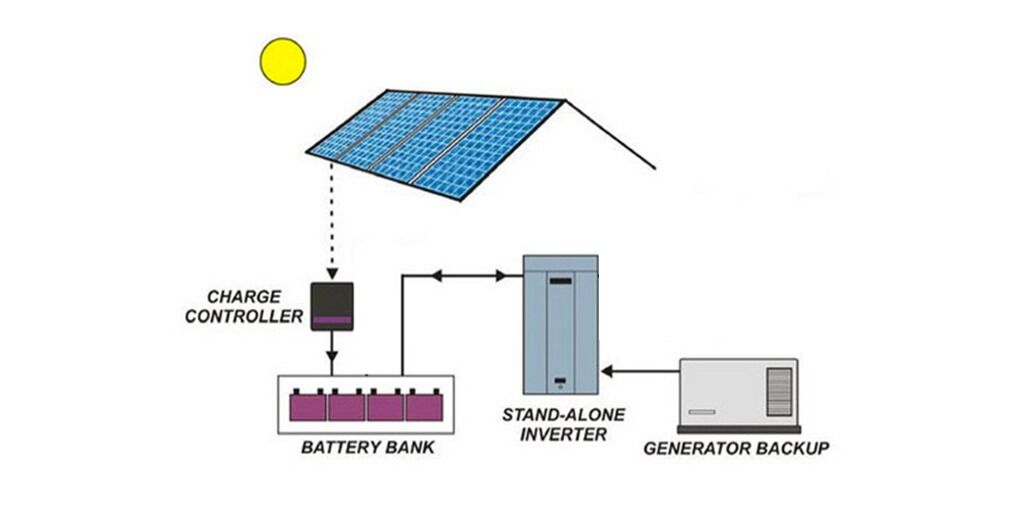If you want to go off the grid, a consistent electricity supply is a top concern. While solar power is an excellent off-the-grid power source, things like cloudy weather, seasonal changes, and the simple existence of nighttime mean you can’t rely on solar power alone—you need a backup power source. The primary options people use for this are batteries, generators, and supplemental renewable energy sources. Which is the best option? Keep reading for a side-by-side comparison.
Battery Storage Systems
Batteries are the most common and efficient backup power option for off-grid solar setups. They store excess solar energy produced during the day and provide that power to you when active solar power isn’t available. Battery systems are quiet, emission-free, and fully automated once you get them hooked up. They allow for seamless transitions between power supplies and can be scaled based on your home’s needs.
The primary drawback of battery storage systems is the cost. High-quality lithium-ion batteries require a significant upfront investment. They also need to be replaced every 10 to 15 years (about half the lifetime of your solar panels themselves), and that usually involves replacing the entire battery bank at once. Extreme temperatures can also reduce the performance of your solar batteries, so you’ll need to make sure that you have a climate-controlled storage space for them.
Backup Generators
Backup generators are another practical and popular solution for off-grid systems, especially during extended cloudy or rainy periods. They run on fuel (usually propane, diesel, or gasoline) and automatically start up when your other power supplies are running low. Generators provide dependable power, regardless of sunlight conditions, and can handle high-demand appliances like well pumps or power tools. They’re also less expensive upfront than large battery banks and simple to install.
However, generators are noisy and require ongoing maintenance, like fuel refills, oil changes, and filter replacements. They also produce emissions, so they’re less environmentally friendly. Over time, fuel costs can add up, especially if your generator has to run frequently.
Other Renewable Energy Sources
A less popular option, but one that may be worth considering, is tapping into other renewable energy sources. Wind turbines are a good one to consider, since cloudy and stormy weather that blocks sunlight usually brings higher winds. Wind turbines can generate power 24/7, and reduce your dependence on sunshine hours. They also keep you tapped into the Earth’s natural energy sources, so you don’t have to worry about your carbon footprint.
However, installing wind turbines can be complicated. You need a good site with the space to install them and fairly consistent winds. Mechanical components, tower costs, noise, view obstructions, and maintenance requirements are also higher when compared to solar panels.
So if you’re looking for Trina Solar panels for sale and want to go off-grid, be sure to tap into a backup power source for the times when your panels can’t produce energy.
Final Thoughts
When it comes to off-grid living, selecting the right backup power option is one of the most an important decisions you will make. The Solar energy alone can not guarantee uninterrupted power, especially during cloudy days, long winters, or increased energy consumption. That’s why having a dependable backup system is essential. Each option whether it’s a battery bank, a fuel-powered generator, or a hybrid combination serves a unique purpose. Batteries offer silent, clean, and automatic backup, making them ideal for everyday use. Generators, however, provide strong and consistent power during extended low-sunlight periods, ensuring you never run out of the electricity. The key is understanding your energy needs, your location’s climate, and your long-term budget before deciding.
Conclusion
In the end, the best backup power solution for off-grid solar is the one that balances reliability, cost, and convenience. Lithium-ion batteries stand out for their efficiency and low maintenance, while generators remain a practical choice for heavy or emergency use. For most off-grid systems, a hybrid approach using batteries as the primary backup with a generator as a secondary source offers the most secure and flexible setup. This combination ensures continuous the energy supply regardless of weather changes or seasonal variations. By choosing the right backup power system, you can enjoy a more stable, self-sufficient, and worry-free off-grid lifestyle.



